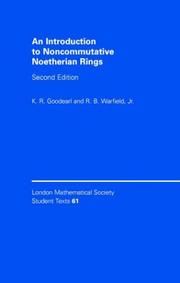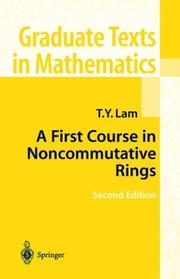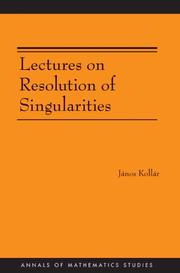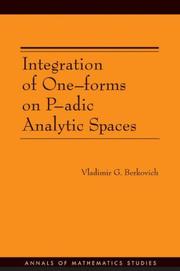| Listing 1 - 10 of 14 | << page >> |
Sort by
|

ISBN: 0521836875 0521545374 0511211929 9780511211928 9780521836876 9780521545372 0511217293 9780511217296 0511215509 9780511215506 9780511841699 0511841698 1107161584 9781107161580 1280540672 9781280540677 9786610540679 6610540675 0511315880 9780511315886 0511213697 9780511213694 Year: 2004 Publisher: Cambridge, U.K. ; New York : Cambridge University Press,
Abstract | Keywords | Export | Availability | Bookmark
 Loading...
Loading...Choose an application
- Reference Manager
- EndNote
- RefWorks (Direct export to RefWorks)
This 2004 introduction to noncommutative noetherian rings is intended to be accessible to anyone with a basic background in abstract algebra. It can be used as a second-year graduate text, or as a self-contained reference. Extensive explanatory discussion is given, and exercises are integrated throughout. Various important settings, such as group algebras, Lie algebras, and quantum groups, are sketched at the outset to describe typical problems and provide motivation. The text then develops and illustrates the standard ingredients of the theory: e.g., skew polynomial rings, rings of fractions, bimodules, Krull dimension, linked prime ideals. Recurring emphasis is placed on prime ideals, which play a central role in applications to representation theory. This edition incorporates substantial revisions, particularly in the first third of the book, where the presentation has been changed to increase accessibility and topicality. Material includes the basic types of quantum groups, which then serve as test cases for the theory developed.
Noetherian rings. --- Noncommutative rings. --- Non-commutative rings --- Associative rings --- Rings, Noetherian --- Commutative rings
Book
ISBN: 1139884212 1107366216 1107370949 1107361303 1107370078 1299404014 1107363756 0511661932 9781107361300 9780511661938 0521317134 9780521317139 Year: 1986 Publisher: Cambridge [U.K.] ; New York : Cambridge University Press,
Abstract | Keywords | Export | Availability | Bookmark
 Loading...
Loading...Choose an application
- Reference Manager
- EndNote
- RefWorks (Direct export to RefWorks)
This monograph first published in 1986 is a reasonably self-contained account of a large part of the theory of non-commutative Noetherian rings. The author focuses on two important aspects: localization and the structure of infective modules. The former is presented in the opening chapters after which some new module-theoretic concepts and methods are used to formulate a new view of localization. This view, which is one of the book's highlights, shows that the study of localization is inextricably linked to the study of certain injectives and leads, for the first time, to some genuine applications of localization in the study of Noetherian rings. In the last part Professor Jategaonkar introduces a unified setting for four intensively studied classes of Noetherian rings: HNP rings, PI rings, enveloping algebras of solvable Lie algebras, and group rings of polycyclic groups. Some appendices summarize relevant background information about these four classes.
Noetherian rings. --- Localization theory. --- Categories (Mathematics) --- Homotopy theory --- Nilpotent groups --- Rings, Noetherian --- Associative rings --- Commutative rings
Book
ISBN: 9783031222924 Year: 2023 Publisher: Cham Springer International Publishing :Imprint: Birkhäuser
Abstract | Keywords | Export | Availability | Bookmark
 Loading...
Loading...Choose an application
- Reference Manager
- EndNote
- RefWorks (Direct export to RefWorks)
This monograph provides an exhaustive treatment of several classes of Noetherian rings and morphisms of Noetherian local rings. Chapters carefully examine some of the most important topics in the area, including Nagata, F-finite and excellent rings, Bertini’s Theorem, and Cohen factorizations. Of particular interest is the presentation of Popescu’s Theorem on Neron Desingularization and the structure of regular morphisms, with a complete proof. Classes of Good Noetherian Rings will be an invaluable resource for researchers in commutative algebra, algebraic and arithmetic geometry, and number theory.
Commutative algebra. --- Commutative rings. --- Commutative Rings and Algebras. --- Rings (Algebra) --- Algebra --- Noetherian rings. --- Rings, Noetherian --- Associative rings --- Commutative rings --- Anells noetherians
Book
ISBN: 0521317134 9780521317139 Year: 1986 Volume: 98 Publisher: Cambridge: Cambridge university press,
Abstract | Keywords | Export | Availability | Bookmark
 Loading...
Loading...Choose an application
- Reference Manager
- EndNote
- RefWorks (Direct export to RefWorks)
Noetherian rings --- Localization theory --- Ordered algebraic structures --- 512.55 --- Rings, Noetherian --- Associative rings --- Commutative rings --- Categories (Mathematics) --- Homotopy theory --- Nilpotent groups --- 512.55 Rings and modules --- Rings and modules --- Anneaux noethériens. --- Noetherian rings. --- Algèbres associatives --- Algèbres associatives --- Anneaux noethériens.

ISBN: 0387953256 0387951830 1441986162 Year: 2001 Publisher: New York, N.Y. Springer
Abstract | Keywords | Export | Availability | Bookmark
 Loading...
Loading...Choose an application
- Reference Manager
- EndNote
- RefWorks (Direct export to RefWorks)
A First Course in Noncommutative Rings, an outgrowth of the author's lectures at the University of California at Berkeley, is intended as a textbook for a one-semester course in basic ring theory. The material covered includes the Wedderburn-Artin theory of semisimple rings, Jacobson's theory of the radical, representation theory of groups and algebras, prime and semiprime rings, local and semilocal rings, perfect and semiperfect rings, etc. By aiming the level of writing at the novice rather than the connoisseur and by stressing th the role of examples and motivation, the author has produced a text that is suitable not only for use in a graduate course, but also for self- study in the subject by interested graduate students. More than 400 exercises testing the understanding of the general theory in the text are included in this new edition.
Noetherian rings. --- Noncommutative rings. --- Noncommutative rings --- 512.55 --- 512.55 Rings and modules --- Rings and modules --- Non-commutative rings --- Associative rings --- Ordered algebraic structures --- Algebra. --- Mathematics --- Mathematical analysis
Book
ISBN: 9780691140490 9780691140483 0691140480 0691140499 9786612644955 1400830559 1282644955 9781400830558 9781282644953 6612644958 Year: 2009 Volume: 170 Publisher: Princeton, N.J. : Princeton University Press,
Abstract | Keywords | Export | Availability | Bookmark
 Loading...
Loading...Choose an application
- Reference Manager
- EndNote
- RefWorks (Direct export to RefWorks)
Higher category theory is generally regarded as technical and forbidding, but part of it is considerably more tractable: the theory of infinity-categories, higher categories in which all higher morphisms are assumed to be invertible. In Higher Topos Theory, Jacob Lurie presents the foundations of this theory, using the language of weak Kan complexes introduced by Boardman and Vogt, and shows how existing theorems in algebraic topology can be reformulated and generalized in the theory's new language. The result is a powerful theory with applications in many areas of mathematics. The book's first five chapters give an exposition of the theory of infinity-categories that emphasizes their role as a generalization of ordinary categories. Many of the fundamental ideas from classical category theory are generalized to the infinity-categorical setting, such as limits and colimits, adjoint functors, ind-objects and pro-objects, locally accessible and presentable categories, Grothendieck fibrations, presheaves, and Yoneda's lemma. A sixth chapter presents an infinity-categorical version of the theory of Grothendieck topoi, introducing the notion of an infinity-topos, an infinity-category that resembles the infinity-category of topological spaces in the sense that it satisfies certain axioms that codify some of the basic principles of algebraic topology. A seventh and final chapter presents applications that illustrate connections between the theory of higher topoi and ideas from classical topology.
Algebraic geometry --- Topology --- Toposes --- Categories (Mathematics) --- Categories (Mathematics). --- Toposes. --- Algebra --- Mathematics --- Physical Sciences & Mathematics --- Category theory (Mathematics) --- Topoi (Mathematics) --- Algebra, Homological --- Algebra, Universal --- Group theory --- Logic, Symbolic and mathematical --- Functor theory --- Adjoint functors. --- Associative property. --- Base change map. --- Base change. --- CW complex. --- Canonical map. --- Cartesian product. --- Category of sets. --- Category theory. --- Coequalizer. --- Cofinality. --- Coherence theorem. --- Cohomology. --- Cokernel. --- Commutative property. --- Continuous function (set theory). --- Contractible space. --- Coproduct. --- Corollary. --- Derived category. --- Diagonal functor. --- Diagram (category theory). --- Dimension theory (algebra). --- Dimension theory. --- Dimension. --- Enriched category. --- Epimorphism. --- Equivalence class. --- Equivalence relation. --- Existence theorem. --- Existential quantification. --- Factorization system. --- Functor category. --- Functor. --- Fundamental group. --- Grothendieck topology. --- Grothendieck universe. --- Group homomorphism. --- Groupoid. --- Heyting algebra. --- Higher Topos Theory. --- Higher category theory. --- Homotopy category. --- Homotopy colimit. --- Homotopy group. --- Homotopy. --- I0. --- Inclusion map. --- Inductive dimension. --- Initial and terminal objects. --- Inverse limit. --- Isomorphism class. --- Kan extension. --- Limit (category theory). --- Localization of a category. --- Maximal element. --- Metric space. --- Model category. --- Monoidal category. --- Monoidal functor. --- Monomorphism. --- Monotonic function. --- Morphism. --- Natural transformation. --- Nisnevich topology. --- Noetherian topological space. --- Noetherian. --- O-minimal theory. --- Open set. --- Power series. --- Presheaf (category theory). --- Prime number. --- Pullback (category theory). --- Pushout (category theory). --- Quillen adjunction. --- Quotient by an equivalence relation. --- Regular cardinal. --- Retract. --- Right inverse. --- Sheaf (mathematics). --- Sheaf cohomology. --- Simplicial category. --- Simplicial set. --- Special case. --- Subcategory. --- Subset. --- Surjective function. --- Tensor product. --- Theorem. --- Topological space. --- Topology. --- Topos. --- Total order. --- Transitive relation. --- Universal property. --- Upper and lower bounds. --- Weak equivalence (homotopy theory). --- Yoneda lemma. --- Zariski topology. --- Zorn's lemma.

ISBN: 0691129231 0691129223 9786612157745 1282157744 1400827809 9781400827800 9780691129228 9780691129235 9781282157743 Year: 2007 Publisher: Princeton, N.J. : Princeton University Press,
Abstract | Keywords | Export | Availability | Bookmark
 Loading...
Loading...Choose an application
- Reference Manager
- EndNote
- RefWorks (Direct export to RefWorks)
Resolution of singularities is a powerful and frequently used tool in algebraic geometry. In this book, János Kollár provides a comprehensive treatment of the characteristic 0 case. He describes more than a dozen proofs for curves, many based on the original papers of Newton, Riemann, and Noether. Kollár goes back to the original sources and presents them in a modern context. He addresses three methods for surfaces, and gives a self-contained and entirely elementary proof of a strong and functorial resolution in all dimensions. Based on a series of lectures at Princeton University and written in an informal yet lucid style, this book is aimed at readers who are interested in both the historical roots of the modern methods and in a simple and transparent proof of this important theorem.
Singularities (Mathematics) --- 512.761 --- Geometry, Algebraic --- Singularities. Singular points of algebraic varieties --- 512.761 Singularities. Singular points of algebraic varieties --- Adjunction formula. --- Algebraic closure. --- Algebraic geometry. --- Algebraic space. --- Algebraic surface. --- Algebraic variety. --- Approximation. --- Asymptotic analysis. --- Automorphism. --- Bernhard Riemann. --- Big O notation. --- Birational geometry. --- C0. --- Canonical singularity. --- Codimension. --- Cohomology. --- Commutative algebra. --- Complex analysis. --- Complex manifold. --- Computability. --- Continuous function. --- Coordinate system. --- Diagram (category theory). --- Differential geometry of surfaces. --- Dimension. --- Divisor. --- Du Val singularity. --- Dual graph. --- Embedding. --- Equation. --- Equivalence relation. --- Euclidean algorithm. --- Factorization. --- Functor. --- General position. --- Generic point. --- Geometric genus. --- Geometry. --- Hyperplane. --- Hypersurface. --- Integral domain. --- Intersection (set theory). --- Intersection number (graph theory). --- Intersection theory. --- Irreducible component. --- Isolated singularity. --- Laurent series. --- Line bundle. --- Linear space (geometry). --- Linear subspace. --- Mathematical induction. --- Mathematics. --- Maximal ideal. --- Morphism. --- Newton polygon. --- Noetherian ring. --- Noetherian. --- Open problem. --- Open set. --- P-adic number. --- Pairwise. --- Parametric equation. --- Partial derivative. --- Plane curve. --- Polynomial. --- Power series. --- Principal ideal. --- Principalization (algebra). --- Projective space. --- Projective variety. --- Proper morphism. --- Puiseux series. --- Quasi-projective variety. --- Rational function. --- Regular local ring. --- Resolution of singularities. --- Riemann surface. --- Ring theory. --- Ruler. --- Scientific notation. --- Sheaf (mathematics). --- Singularity theory. --- Smooth morphism. --- Smoothness. --- Special case. --- Subring. --- Summation. --- Surjective function. --- Tangent cone. --- Tangent space. --- Tangent. --- Taylor series. --- Theorem. --- Topology. --- Toric variety. --- Transversal (geometry). --- Variable (mathematics). --- Weierstrass preparation theorem. --- Weierstrass theorem. --- Zero set. --- Differential geometry. Global analysis
Book
ISBN: 1283379961 9786613379962 1400842700 9781400842704 9781283379960 9780691153308 9780691153315 0691153302 0691153310 Year: 2012 Publisher: Princeton ; Oxford : Princeton University Press,
Abstract | Keywords | Export | Availability | Bookmark
 Loading...
Loading...Choose an application
- Reference Manager
- EndNote
- RefWorks (Direct export to RefWorks)
Convolution and Equidistribution explores an important aspect of number theory--the theory of exponential sums over finite fields and their Mellin transforms--from a new, categorical point of view. The book presents fundamentally important results and a plethora of examples, opening up new directions in the subject. The finite-field Mellin transform (of a function on the multiplicative group of a finite field) is defined by summing that function against variable multiplicative characters. The basic question considered in the book is how the values of the Mellin transform are distributed (in a probabilistic sense), in cases where the input function is suitably algebro-geometric. This question is answered by the book's main theorem, using a mixture of geometric, categorical, and group-theoretic methods. By providing a new framework for studying Mellin transforms over finite fields, this book opens up a new way for researchers to further explore the subject.
Mellin transform. --- Convolutions (Mathematics) --- Sequences (Mathematics) --- Mathematical sequences --- Numerical sequences --- Algebra --- Mathematics --- Convolution transforms --- Transformations, Convolution --- Distribution (Probability theory) --- Functions --- Integrals --- Transformations (Mathematics) --- Transform, Mellin --- Integral transforms --- ArtinГchreier reduced polynomial. --- Emanuel Kowalski. --- EulerАoincar formula. --- Frobenius conjugacy class. --- Frobenius conjugacy. --- Frobenius tori. --- GoursatЋolchinВibet theorem. --- Kloosterman sheaf. --- Laurent polynomial. --- Legendre. --- Pierre Deligne. --- Ron Evans. --- Tannakian category. --- Tannakian groups. --- Zeeev Rudnick. --- algebro-geometric. --- autodual objects. --- autoduality. --- characteristic two. --- connectedness. --- dimensional objects. --- duality. --- equidistribution. --- exponential sums. --- fiber functor. --- finite field Mellin transform. --- finite field. --- finite fields. --- geometrical irreducibility. --- group scheme. --- hypergeometric sheaf. --- interger monic polynomials. --- isogenies. --- lie-irreducibility. --- lisse. --- middle convolution. --- middle extension sheaf. --- monic polynomial. --- monodromy groups. --- noetherian connected scheme. --- nonsplit form. --- nontrivial additive character. --- number theory. --- odd characteristic. --- odd prime. --- orthogonal case. --- perverse sheaves. --- polynomials. --- pure weight. --- semisimple object. --- semisimple. --- sheaves. --- signs. --- split form. --- supermorse. --- theorem. --- theorems.
Book
ISBN: 0691080291 1322884943 069164554X 1400869293 9781400869299 9780691618548 0691618542 Year: 2015 Publisher: Princeton, NJ : Princeton University Press,
Abstract | Keywords | Export | Availability | Bookmark
 Loading...
Loading...Choose an application
- Reference Manager
- EndNote
- RefWorks (Direct export to RefWorks)
This book is a sequel to Lectures on Complex Analytic Varieties: The Local Paranwtrization Theorem (Mathematical Notes 10, 1970). Its unifying theme is the study of local properties of finite analytic mappings between complex analytic varieties; these mappings are those in several dimensions that most closely resemble general complex analytic mappings in one complex dimension. The purpose of this volume is rather to clarify some algebraic aspects of the local study of complex analytic varieties than merely to examine finite analytic mappings for their own sake.Originally published in 1970.The Princeton Legacy Library uses the latest print-on-demand technology to again make available previously out-of-print books from the distinguished backlist of Princeton University Press. These editions preserve the original texts of these important books while presenting them in durable paperback and hardcover editions. The goal of the Princeton Legacy Library is to vastly increase access to the rich scholarly heritage found in the thousands of books published by Princeton University Press since its founding in 1905.
Complex analysis --- Analytic spaces --- Mathematics --- Physical Sciences & Mathematics --- Calculus --- Spaces, Analytic --- Analytic functions --- Functions of several complex variables --- Algebra homomorphism. --- Algebraic curve. --- Algebraic extension. --- Algebraic surface. --- Algebraic variety. --- Analytic continuation. --- Analytic function. --- Associated prime. --- Atlas (topology). --- Automorphism. --- Bernhard Riemann. --- Big O notation. --- Branch point. --- Change of variables. --- Characterization (mathematics). --- Codimension. --- Coefficient. --- Cohomology. --- Complete intersection. --- Complex analysis. --- Complex conjugate. --- Complex dimension. --- Complex number. --- Connected component (graph theory). --- Corollary. --- Critical point (mathematics). --- Diagram (category theory). --- Dimension (vector space). --- Dimension. --- Disjoint union. --- Divisor. --- Equation. --- Equivalence class. --- Exact sequence. --- Existential quantification. --- Finitely generated module. --- Geometry. --- Hamiltonian mechanics. --- Holomorphic function. --- Homeomorphism. --- Homological dimension. --- Homomorphism. --- Hypersurface. --- Ideal (ring theory). --- Identity element. --- Induced homomorphism. --- Inequality (mathematics). --- Injective function. --- Integral domain. --- Invertible matrix. --- Irreducible component. --- Isolated singularity. --- Isomorphism class. --- Jacobian matrix and determinant. --- Linear map. --- Linear subspace. --- Local ring. --- Mathematical induction. --- Mathematics. --- Maximal element. --- Maximal ideal. --- Meromorphic function. --- Modular arithmetic. --- Module (mathematics). --- Module homomorphism. --- Monic polynomial. --- Monomial. --- Neighbourhood (mathematics). --- Noetherian. --- Open set. --- Parametric equation. --- Parametrization. --- Permutation. --- Polynomial ring. --- Polynomial. --- Power series. --- Quadratic form. --- Quotient module. --- Regular local ring. --- Removable singularity. --- Ring (mathematics). --- Ring homomorphism. --- Row and column vectors. --- Scalar multiplication. --- Scientific notation. --- Several complex variables. --- Sheaf (mathematics). --- Special case. --- Subalgebra. --- Submanifold. --- Subset. --- Summation. --- Surjective function. --- Taylor series. --- Theorem. --- Three-dimensional space (mathematics). --- Topological space. --- Vector space. --- Weierstrass preparation theorem. --- Zero divisor. --- Fonctions de plusieurs variables complexes --- Variétés complexes

ISBN: 0691128626 1299133339 1400837154 0691127417 9781400837151 9780691127415 9780691128627 9781299133334 Year: 2007 Volume: no. 162 Publisher: Princeton, N.J. : Princeton University Press,
Abstract | Keywords | Export | Availability | Bookmark
 Loading...
Loading...Choose an application
- Reference Manager
- EndNote
- RefWorks (Direct export to RefWorks)
Among the many differences between classical and p-adic objects, those related to differential equations occupy a special place. For example, a closed p-adic analytic one-form defined on a simply-connected domain does not necessarily have a primitive in the class of analytic functions. In the early 1980s, Robert Coleman discovered a way to construct primitives of analytic one-forms on certain smooth p-adic analytic curves in a bigger class of functions. Since then, there have been several attempts to generalize his ideas to smooth p-adic analytic spaces of higher dimension, but the spaces considered were invariably associated with algebraic varieties. This book aims to show that every smooth p-adic analytic space is provided with a sheaf of functions that includes all analytic ones and satisfies a uniqueness property. It also contains local primitives of all closed one-forms with coefficients in the sheaf that, in the case considered by Coleman, coincide with those he constructed. In consequence, one constructs a parallel transport of local solutions of a unipotent differential equation and an integral of a closed one-form along a path so that both depend nontrivially on the homotopy class of the path. Both the author's previous results on geometric properties of smooth p-adic analytic spaces and the theory of isocrystals are further developed in this book, which is aimed at graduate students and mathematicians working in the areas of non-Archimedean analytic geometry, number theory, and algebraic geometry.
p-adic analysis. --- Analysis, p-adic --- Algebra --- Calculus --- Geometry, Algebraic --- Abelian category. --- Acting in. --- Addition. --- Aisle. --- Algebraic closure. --- Algebraic curve. --- Algebraic structure. --- Algebraic variety. --- Allegory (category theory). --- Analytic function. --- Analytic geometry. --- Analytic space. --- Archimedean property. --- Arithmetic. --- Banach algebra. --- Bertolt Brecht. --- Buttress. --- Centrality. --- Clerestory. --- Commutative diagram. --- Commutative property. --- Complex analysis. --- Contradiction. --- Corollary. --- Cosmetics. --- De Rham cohomology. --- Determinant. --- Diameter. --- Differential form. --- Dimension (vector space). --- Divisor. --- Elaboration. --- Embellishment. --- Equanimity. --- Equivalence class (music). --- Existential quantification. --- Facet (geometry). --- Femininity. --- Finite morphism. --- Formal scheme. --- Fred Astaire. --- Functor. --- Gavel. --- Generic point. --- Geometry. --- Gothic architecture. --- Homomorphism. --- Hypothesis. --- Imagery. --- Injective function. --- Irreducible component. --- Iterated integral. --- Linear combination. --- Logarithm. --- Marni Nixon. --- Masculinity. --- Mathematical induction. --- Mathematics. --- Mestizo. --- Metaphor. --- Morphism. --- Natural number. --- Neighbourhood (mathematics). --- Neuroticism. --- Noetherian. --- Notation. --- One-form. --- Open set. --- P-adic Hodge theory. --- P-adic number. --- Parallel transport. --- Patrick Swayze. --- Phrenology. --- Politics. --- Polynomial. --- Prediction. --- Proportion (architecture). --- Pullback. --- Purely inseparable extension. --- Reims. --- Requirement. --- Residue field. --- Rhomboid. --- Roland Barthes. --- Satire. --- Self-sufficiency. --- Separable extension. --- Sheaf (mathematics). --- Shuffle algebra. --- Subgroup. --- Suggestion. --- Technology. --- Tensor product. --- Theorem. --- Transept. --- Triforium. --- Tubular neighborhood. --- Underpinning. --- Writing. --- Zariski topology.
| Listing 1 - 10 of 14 | << page >> |
Sort by
|

 Search
Search Feedback
Feedback About UniCat
About UniCat  Help
Help News
News